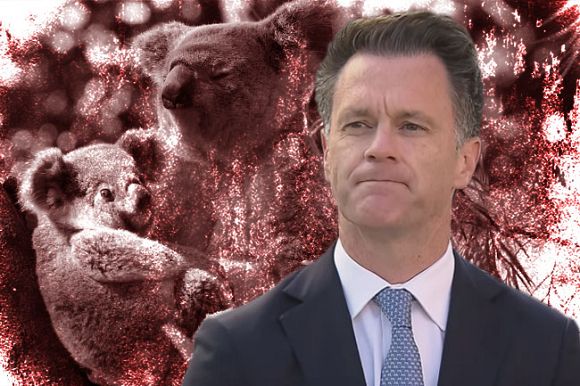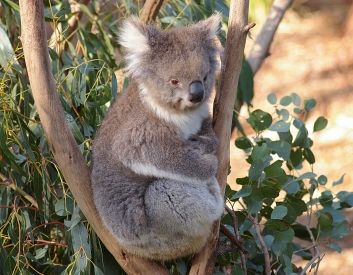The NSW Government must embrace greater transparency and consultation to save koalas in the state, writes Sue Arnold.
WELCOME TO New South Wales, the home of secret government. Transparency is out the window, conferences by invitation only and non-disclosure agreements for participants.
Sounds like one of those autocracies?
Penny Sharpe, NSW Minister for Climate Change, Environment and Energy, has provided a compelling example of how the Minns’ Labor Government does its business.
In response to overwhelming public concern about the koala, with local extinctions increasing and aided by native forest logging, Sharpe announced a NSW Koala Summit at Taronga Zoo would take place on 22 March.
The Summit is designed:
'... to inform the Government’s work to protect the Australian icon.'
Was the choice to hold the summit at the Zoo a subliminal message?
The Summit, so the Department of Environment and Heritage says:
... will be an opportunity for the NSW Government to hear from a diverse range of stakeholders, including non-government organisations, private landholders, local councils, Aboriginal representatives, academics and researchers, businesses and policy makers.
Other media reports say wildlife carers, farmers and government agencies will also be among the invitees.
All in a day?
But wait:
'Attendance at the Koala Summit will be by invitation only and numbers will be limited to approximately 150 people.'
There will be no list of invitees for the public to scrutinise. No agenda. No information on speakers. No media allowed.
Unfortunately, those of us who have made efforts to get the Minister and the Minns’ Government to listen, much less act, to ensure koalas survive in the state, have fallen on deaf political ears. The use of the phrase 'Government’s work to protect the Australian icon' can only be described as greenwashing.
The Summit excluded mob, which is fairly substantial given Sharpe’s considerable efforts to ensure no one likely to upset the apple cart gets an invite, continues to wait patiently for a report on the outcome of the one-day Summit.
But nothing comes out except more empty words from the Minister, as reported by the Canberra Times.
'I know many of you are deeply concerned about the impact of forestry activities on koalas.'
Absolutely. That’s why thousands of Australians marched in many cities calling for a ban on native forest logging. Organised by the Bob Brown Foundation, mainstream media coverage of the marches was minimal, as usual.
Sharpe’s "solution" is:
' … work was beginning with industry on a road map for sustainable forestry and forest-based industries across NSW. All of you will be part of this.'
Whether this statement means the select 150, the excluded ones, or the broader community is not explained.
A road map is not the solution. Legal habitat protection, a ban on native forest logging and the immediate designation of the Great Koala National Park are needed.
Whilst the non-actions of the NSW Government can be rightly condemned, we should not let the invited NGOs off the hook.
CEO of Nature Conservation Council (NCC) Jacqui Mumford is reported as saying:
'One of the key themes we discussed was revisiting Forestry Corp and re-imagining forestry for NSW. The Minister certainly acknowledged the threatening processes around habitat destruction.'
As NCC claims to be 'the voice for nature in NSW', its CEO’s response to the forestry issue was weak. Banning native forest logging is a must. Scientific evidence is overwhelming on the grounds of biodiversity loss, carbon emissions and ecosystem vitality.
Ironically, a few days earlier, Mumford marked the International Day of Forests by launching Professor David Lindenmayer’s new book, Forest Wars. Professor Lindenmayer is a world-leading expert on forest conservation.
And he is a tireless advocate for a ban on native forest logging.
A WWF representative is reported as saying the ongoing logging of the Great Koala National Park when no boundaries were settled 'is an acknowledgement by the Government that this is an issue they have to address'.
This is stating the obvious.
Mark Graham, an ecologist not invited to the Summit, is a highly vocal advocate and respected campaigner for the Great Koala National Park who reportedly said:
If the [NSW] Government was serious about preventing the extinction of the koala, the simplest action it could take would be to immediately stop logging and protect all koala hubs and nationally important areas in state forests, both within and outside the boundaries of the proposed park.
There have been no reports by invited NGOs on what took place in the Summit proceedings.
Given the significant community outrage over the ongoing industrial logging of native forests, a boycott of the conference by all koala conservation groups might have been a more logical response.
Secrecy by Sharpe is becoming commonplace. A colleague invited to attend a climate change conference to consult on proposed legislation to achieve the Government’s pledge of net-zero emissions by 2050 was told to sign a non-disclosure agreement.
The agreement meant that discussions in the meeting were prohibited from being aired elsewhere.
In November 2023, Sharpe abruptly cancelled an invitation-only meeting with key stakeholders and voluntary advocates for the Great Koala National Park in Coffs Harbour.
Sharpe decided not to attend because a group of people – including Knitting Nanas with protest signs and the media – was waiting at the entrance of the meeting venue.
Another meeting was organised on Zoom by the Minister’s office.
One participant described the meeting "as very respectful and everyone at the meeting was looking forward to finding solutions".
The willingness of many Australians to believe anything politicians say and promise is nothing short of extraordinary.
In many respects, it seems to have infected some environmental organisations which prefer diplomacy to action. "Talk fests" with governments systematically ignoring the domestic and international community and scientists’ growing outrage over the ongoing slaughter of koalas are preferred.
A recent judgment in the Federal Court focused on the NSW North East Regional Forest Agreement – a bilateral agreement with the Commonwealth on forestry – found against arguments demonstrating governmental failures to take into account current biodiversity loss, climate change impacts and old-growth forests.
The Court said:
'Whether or not to enter into or vary an intergovernmental environment agreement of this nature is essentially a political one, the merits of which are matters for the government parties and not the Courts to determine.'
Don't hold your breath if the issue is left to NSW voters and major conservation NGOs to force political change resulting in koala survival for the foreseeable future.
Government response is likely to be more invitation-only conferences, summits, panels and advisory groups, combined with a tsunami of paper policies that are not implemented.
The fix is in.
Sue Arnold is an IA columnist and freelance investigative journalist. You can follow Sue on Twitter @koalacrisis.
Related Articles
 This work is licensed under a Creative Commons Attribution-NonCommercial-NoDerivs 3.0 Australia License
This work is licensed under a Creative Commons Attribution-NonCommercial-NoDerivs 3.0 Australia License
Support independent journalism Subscribe to IA.














